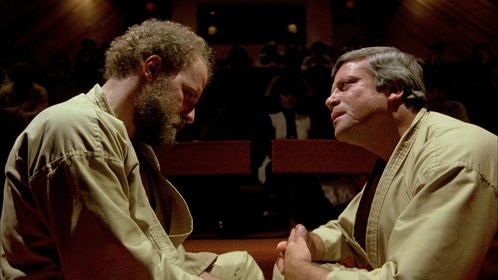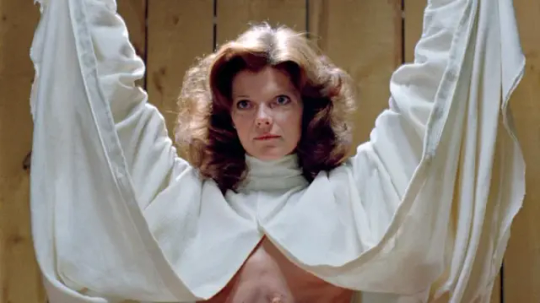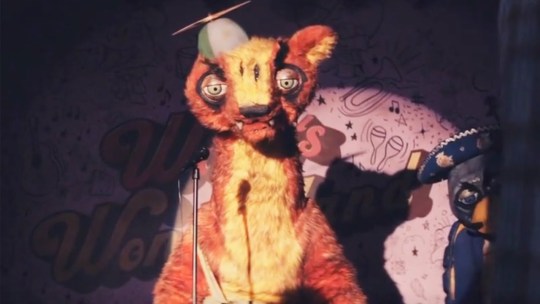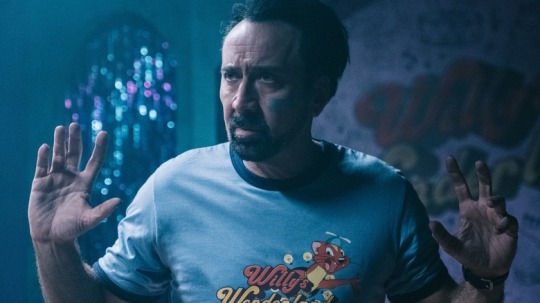archive of deranged and unstructured thoughts about a few films i watch. letterboxd for all movies watched since i started tracking in '22
Don't wanna be here? Send us removal request.
Text
The Brood (1979)

The Brood cements itself as a look into the human psyche through the Cronenberg approach of murder and mutilation as metaphors. The protagonist is trapped in a custody battle with his estranged, psychologically unwell wife. We switch viewpoints, occasionally getting a glimpse into the strange therapy Dr. Raglan uses on Nola, but mostly follow Frank Carveth. The antagonistic creatures are mutant children, later revealed to be born from Frank's wife and out of her familial trauma, who kill multiple people associated with the family. His daughter is a witness to the mutilating murder of her grandmother, Frank's mother in law, and is dragged into the background of the movie. Neither of her parents are around her too much and we learn little of her. What the viewer does learn is that her body is blistering, scarred by what we are told are her mother's actions, and she appears meek and withdrawn. Without looking deeper into the subject, the movie seems to be an excuse to simply maim and mangle. Supplemented by Cronenberg's own experiences, the film gains more strength than already inside it. The reflection of divorce, of thee horrors and damage it does on all members of the family. Those around them die, the maximal distance they can take from the family. The child is inflicted with so much pain, it shows up on her physically. Especially powerful is the last act, where the movie culminates. Nola's body has transformed unnaturally, a sac hangs out from her insides and gives birth to yet another mutant child. Animalistically she licks off the blood from the misshapen humanoid, and her husband only watches on. She takes no issue with her own birthing, sees no fault in her own, but instead summons her anger at her husband's disgust. And the mutant children, rooms away respond, roused by the tantrum she begins to throw. They kill the last person that has any connection to their daughter, her or her family: The psychologist that has let her birth all of these emotion-driven beings. But Nola is in the right. To her, she only made sure her daughter would never be taken from her. Not her mother, not her father or the school teacher were allowed to be close to the child. She finds a way to be with her daughter forever, to never risk having custody wrested from her: Killing her. And it is a horrific ending to a horrific film, when Nola finally lies dead at the hands of her husband in a desparate bid to stop his daughter from being killed. It works, but at what cost? He has won custody, won the divorce but at what cost? Everyone lays dead, his child permanently scarred from the ordeal and unwilling to lay eyes on her father. Cronenberg sees humanity at its edge and renders a very common problem through his lens, a problem he himself has been a part of, and expresses the ugliness in his creauture design. The movie captivates in a way no one else could, the blisters that remain on the young child's body are the same as those that grew to the alien womb on her mother. Her mother, whose blisters are a direct metaphor to familial abuse and trauma, giving them over to her child and perpetuating the cycle. Because unless snuffed at its core, the trauma will forever be passed down.
Closing, this movie has burned itself into my psyche. It is sickening in its message and its execution so strikingly gruesome, that it is hard to forget watching it. Which is a good thing, really! I just regret watching this as my last movie of the night, instead of something lighter, as to not lie awake pondering the importance of family.

1 note
·
View note
Text
Willy's Wonderland (2021)

I can't NOT make a comment about this movie, I need to as a reminder to myself how much fun I had for these 88 minutes. This is what the moving picture was invented for. Willy's Wonderland starring Nicolas Cage, who for some reason is rendered mute over the full duration of its runtime, involves 8 possessed animatronics who feast on human flesh. Spoiler! We learn that the origin of this possession can be traced back to a group of family murderers, who in a ritualistic suicide escaped from the police. This, obviously, caused them to possess the animatronics they used to lure the families to their deaths. It is only logical! Nicolas Cage's character is entirely carried by his superb acting. He is mute, doesn't really show any emotions outside of "Man I gotta kill this machine now" and "Holy shit I want to have my hourly PUNCH drink and play pinball!", and is able to take out most of the antagonists through sheer strength. Do you too wish to see Nic Cage choke a machine to death with his thighs? You can! Is it ever explained why, under the constant threat of being killed by any of the machines, he decides to drop everything he's doing, walk calmly away from a fight and goes to play various games in the facility? No, it is not. Is it ever explained why he does not speak or acknowledge ANY of the other characters? No, it is not. Does this drastically improve how fun this movie is? Yes. Marketed as a horror comedy movie, Willy's Wonderland is not scary, but for fans of camp comedy it delivers. If you dislike weird camp, don't watch this. Unless maybe you get drunk before, I think this would be amazing when drunk, but I'll get back to that once I force people to watch this. Especially the scene in which Nic Cage improvises a pinball machine dance. Improvises, as stated in the official facts of this movie. He really knew how to appease the camp audience and we love him for it.
I'd LOVE to get into the philosophies this film encompasses, what meaning there is to be handed over to its viewership. But I am entirely certain, the director wanted nothing more than to have Nic Cage effectively adopt a grown child by the end of the movie after completing his night shift. For some reason also, there is a Mexican animatronic. This is, probably, not because of the age their establishment was created (1984), but rather because Lewis thought making one of them speak Spanish. This didn't improve the movie and that anecdote is more of a warning. The cinematography is absolutely horrid, so don't expect pretty shots outside of Nicholas Cage looking good. Maybe the sex scene if you're into teens fucking for...no reason other than checking that camp horror box. The colourgrading is all over the place, with weirdly bright vibrancy at some points and just brown-black shots in other places. It's really not a good movie. I recommend watching this.

0 notes
Text
Crimes of the Future (2022)

I finally got to watching Cronenberg's newest production and expectedly, it stuns in visuals and storytelling. Crimes of the Future plays in the distant future, where humanity has enhanced life with technologies that visually remind of alien bodies and which directly interacts with our bodily functions. The body horror aspect he introduces is human evolution -- the body rapidly growing new organs. The introduction captures. A child, a shipwreck floating within close distance, plastic buckets. We are allowed to observe the boy chewing on the bucket; we are an observer just like his mother. And it culminates in filicide, the disdain towards her own child and the husband who gave it to her is all that hangs in the air. Then Cronenberg thrusts the viewer deep into his new world, following a performance artist duo for the rest of the film, we experience what has become of art and medicine. Between Saul Tenser, the man who grows organs at an abnormal rate and hates it, and his partner Caprice, who makes them into art as she removes them, the viewer observes.

Art is body. Art is evolution. Art is everything.
The absence of pain, the new growths inside the body, the changing human race is glorified. Cronenberg lets us into this world, shows the giant showrooms, the filled theatres for this new performance art: Surgery. Everyone loves viewing the artists cut into their partners, watch them tattoo the most intimate parts of the human body and watch flesh give way to metal. Pain has become a form of pleasure, "Surgery is the new sex". He cements this new life philosophy in the prolific duo we follow, we watch them lay together naked and let their tech, their art supplies, cut into them. Sure, we also get a sex scene, an oral service conducted on our lead's organs, but any Cronenberg viewer is used to these by now. The beauty of art being second to none juxtaposes the complete abandonment of medicine. The set design splits the worlds apart, the filled, extravagant art environments distanced from the empty, run-down organ registration offices. And its discomforting. The mold on the walls urges the viewer to leave the scene, to return to the performance art, instead of staying in these horrible rooms. I'm not here to give a full recap, rather, my critique serves me. My deep wish to appreciate this movie in all its beauty stilled through the written word. Cronenberg's newest movie plays on the theme of mortality. How humanity will survive when rid of their pain system, and the adaptation that our flesh tries to push onto us. They're self-inflicted evolutionary traits: the world's ecosystem is gone, the viewer is never given a shred of nature outside of the opening. In Cronenbergian fashion, we view simply the intersection of machinery and flesh. What our own need to further technology has done to our psyche, our biology, our very beings. How should the human body adapt? The evolutionists answer: new digestion. Plastic, available en masse, finally bio-degradable by those who caused its massive spread in the first place. Returning the trash to the trasher. We are left to wonder if humanity will survive. Are we still human if our bodies evolve with unrecognizable organs, alien flesh inside us? Can we survive if these evolutions, this lack of pain, awakens the desire for self-destruction? How far will we go? The new sex, the new pleasure of complete self-mutilation will end up killing our species before the new evolved humanity can replace the old. And we aren't the only one who is faced with this existential problem. Struggling throughout the entire movie with his own mortality, with his own body and with where in the world he will ever belong, our protagonist Saul Tenser eventually has to accept the new world. With a beautifully choreographed scene, that records his most intimate, his reluctant acceptance, on camera Saul Tenser eats a bar of plastic. Fed to him by his partner, who has long given herself to the evolutionist minds, he cries. Sitting on the machinery made to serve him, he cries. Fed the material made to last, he cries. Because the world that kills him, the body that has undergone thousands of removal surgeries, will stay with him forever. And we are left with more questions than we have answered. Provocative, thought-provoking and supplemented with the sensual camera work of Douglas Koch, Cronenberg creates this beautifully horrific piece of cinema once again. And what am I, if not a man who loves his work? Though I have been severely disappointed by the man himself not acting in this, he has always been a great addition to his own cast.

2 notes
·
View notes